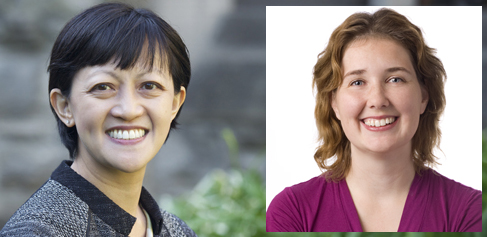
Bloomberg Faculty Members: Doris Leung and Martine Puts
Bloomberg Nursing assistant professors Doris Leung and Martine Puts are the recipients of University of Toronto Connaught New Researcher Awards. The selection process is highly competitive as new faculty members from across the university vie for funding from the $1 million awarded annually.
Leung’s study examines the social factors of intensive care units (ICUs) that contribute to timely decisions during transitions from acute to end-of-life care for patients with chronic critical illness and their families. This growing population of aging individuals experiences profound complications and some of the highest reported levels of pain and distress. In Ontario, while they account for only three per cent of admissions to ICUs, they consume up to 40 per cent of resources. Comprehending the patients’ and families’ understanding of the use of technologies, such as mechanical ventilation, could mitigate the delay of transitioning to end-of-life care. “I’m honoured at having received this award. It shows appreciation for research that highlights the social complexity of how decisions are made moving from acute to end-of-life care,” said Leung. “Furthermore, the award acknowledged that attention be given to the needs of a specialized group of patients and their families worthy of study in critical care units.”
Puts’ project is a systematic review that explores the factors influencing older adults’ adherence to cancer treatment. It’s estimated half of older patients (65+) are non-adherent to their treatment, even though adherence is crucial to obtaining optimal health outcomes such as cure or improvement of quality of life. In addition, non-adherence has shown to negatively affect cancer outcomes, including higher recurrence rates and shorter survival. Evidence produced will help clinicians better support their older adult patients, as well as assist nurses to develop interventions to improve cancer treatment adherence. “I am very happy to have received this award so that we can look at this significant problem,” added Puts. “This is a manageable issue influencing cancer outcomes, so it’s important we understand the reasons behind the behaviour.”
The Connaught New Researcher Program is designed to foster excellence in research and innovation by providing support for researchers at the assistant professor level who are within the first five years of their first academic appointment at the University of Toronto. The awards are intended to help these early-career researchers establish a strong research program, thereby increasing their competitiveness for external funding.
“Our hope is that by providing a boost to early-career researchers, we’ll ensure their continued success,” said Professor Paul Young, U of T’s vice-president (research) and chair of the Connaught committee. “Having a strong research program already established helps researchers compete for external funding.”
Leung and Puts are joined by 65 other researchers from across the university who have been awarded grants totalling just over $1.1 million.
“Congratulations to the winners,” said Young. “This award recognizes not only that they’re already doing excellent, thoughtful work, but that they have the potential to have great impact throughout their careers.”
Founded in 1972, the Connaught Fund was created from the sale of Connaught Laboratories, which first mass-produced insulin, the Nobel award-winning discovery of U of T researchers Frederick Banting, Charles Best, J.J.R. Macleod and James Collip. The University has stewarded the fund in the years since, awarding more than $120 million to U of T researchers. Today, the fund invests nearly $4 million annually in emerging and established scholars.
Previous recent recipients from the Bloomberg Faculty of Nursing include Monica Parry, Robyn Stremler and Michael McGillion.